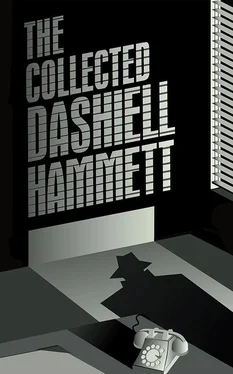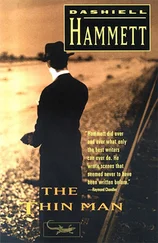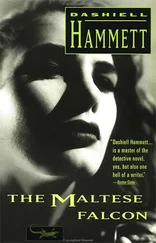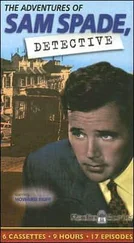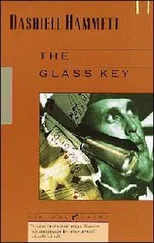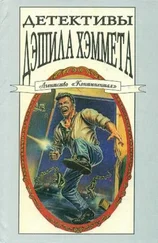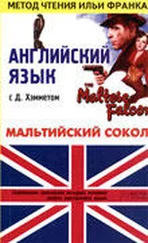“I mean did she know you just now?”
“I don’t think she saw me. Anyway, she didn’t give me a tumble.”
“You don’t know the other one?”
“No. She’s a blonde, kind of pretty.”
“O.K.,” I said. “Stick around a while, but out of sight. Maybe I’ll be bringing them back with me.” I crossed the street to the undertaking parlor.
Ethel Furman was prettier than her photograph had indicated. The woman with her was five or six years older, quite a bit larger, handsome in a big, somewhat coarse way. Both of them were attractively dressed in styles that hadn’t reached Deerwood yet.
The big woman was introduced to me as Mrs. Crowder. I said, “I thought your name was Randall.”
She laughed. “What do you care, Chief? I’m not hurting your town.”
I said, “Don’t call me Chief. To you big-city slickers I’m the town whittler. We go back through here.”
Ethel Furman didn’t make any fuss over her husband when she saw him. She simply looked gravely at his face for about three minutes, then turned away and said, “Thank you,” to me.
“I’ll have to ask you some questions,” I said, “so if you’ll come across the street...”
She nodded. “And I’d like to ask you some.” She looked at her companion. “If Mrs. Crowder will—”
“Call her Hotcha,” I said. “We’re all among friends. Sure, she’ll come along, too.”
The Randall woman said, “Aren’t you the cut-up?” and took my arm.
In my office I gave them chairs and said, “Before I ask you anything I want to tell you something. Furman didn’t commit suicide. He was murdered.”
Ethel Furman opened her eyes wide. “Murdered?”
Hotcha Randall said, as if she had had the words on the tip of her tongue right along, “We’ve got alibis. We were in New York. We can prove it.”
“You’re likely to get a chance to, too,” I told her. “How’d you people happen to come down here?”
Ethel Furman repeated, “Murdered?” in a dazed tone.
The Randall woman said, “Who’s got a better right to come down here? She was still his wife, wasn’t she? She’s entitled to some of his estate, isn’t she? She’s got a right to look out for her own interests, hasn’t she?”
That reminded me of something. I picked up the telephone and told Hammill to have somebody get hold of the lawyer Wheelock — he had stayed over for the inquest, of course — before he left town, and tell him I wanted to see him. “And is Wally around?”
“He’s not here. He said you told him to keep out of sight. I’ll find him, though.”
“Right. Tell him I want him to go to New York to-night. Send Mason home to get some sleep. He’ll have to take over Wally’s night trick.”
Hammill said, “Oke,” and I turned back to my guests.
Ethel Furman had come out of her daze. She leaned forward and asked, “Mr. Anderson, do you think I had — had anything to do with Lester’s — with his death?”
“I don’t know. I know he was killed. I know he left you something like half a million.”
The Randall woman whistled softly. She came over and put a diamond-ringed hand on my shoulder. “Dollars?”
When I nodded, the delight went out of her face, leaving it serious. “All right, Chief,” she said, “now don’t be a clown. The kid didn’t have a thing to do with whatever you think happened. We read about him committing suicide in yesterday morning’s paper, and about there being something funny about it, and I persuaded her to come down and—”
Ethel Furman interrupted her friend. “Mr. Anderson, I wouldn’t have done anything to hurt Lester. I left him because I wanted to leave him, but I wouldn’t have done anything to him for money or anything else. Why, if I’d wanted money from him all I’d’ve had to do would’ve been to ask him. Why, he used to put ads in papers telling me if I wanted anything to let him know, but I never did. You can — his lawyer — anybody who knew anything about it can tell you that.”
The Randall woman took up the story. “That’s the truth, Chief. I’ve been telling her she was a chump not to tap him, but she never would. I had a hard enough time getting her to come for her share now he’s dead and got nobody else to leave it to.”
Ethel Furman said, “I wouldn’t’ve hurt him.”
“Why’d you leave him?”
She moved her shoulders. “I don’t know how to say it. The way we lived wasn’t the way I wanted to live. I wanted — I don’t know what. Anyway, after the baby died I couldn’t stand it any more and cleared out, but I didn’t want anything from him and I wouldn’t’ve hurt him. He was always good to me. I was — I was the one that was wrong.”
The telephone rang. Hammill’s voice. “I found both of ’em. Wally’s home. I told him. The old guy Wheelock is on his way over.”
I dug out the phony reward circular and showed it to Ethel Furman. “This is what got him into the can. Did you ever see that picture before?”
She started to say “No,” then a frightened look came into her face. “Why, that’s — it can’t be. It’s — it’s a snapshot I had — have. It’s an enlargement of it.”
“Who else has one?”
Her face became more frightened, but she said, “Nobody that I know of. I don’t think anybody else could have one.”
“You’ve still got yours?”
“Yes. I don’t remember whether I’ve seen it recently — it’s with some old papers and things — but I must have it.”
I said, “Well, Mrs. Furman, it’s stuff like that that’s got to be checked up, and neither of us can dodge it. Now there are two ways we can play it. I can hold you here on suspicion till I’ve had time to check things up, or I can send one of my men back to New York with you for the check-up. I’m willing to do that if you’ll speed things up by helping him all you can and if you’ll promise me you won’t try any tricks.”
“I promise,” she said. “I’m as anxious as you are to—”
“All right. How’d you come down?”
“I drove,” the Randall woman said. “That’s my car, the big green one across the street.”
“Fine. Then he can ride back with you, but no funny business.”
The telephone rang again while they were assuring me there would be no funny business. Hammill said, “Wheelock’s here.”
“Send him in.”
The lawyer’s asthma nearly strangled him when he saw Ethel Furman. Before he could get himself straightened out I asked, “This is really Mrs. Furman?”
He wagged his head up and down, still wheezing.
“Fine,” I said. “Wait for me. I’ll be back in a little while.” I herded the two women out and across the street to the green car. “Straight up to the end of the street and then two blocks left,” I told the Randall woman, who was at the wheel.
“Where are we going?” she asked.
“To see Shane, the man who’s going to New York with you.”
Mrs. Dober, Wally’s landlady, opened the door for us.
“Wally in?” I asked.
“Yes, indeedy, Mr. Anderson. Go right on up.” She was staring with wide-eyed curiosity at my companions while talking to me.
We went up a flight of stairs and I knocked on his door.
“Who is it?” he called.
“Scott.”
“Come on in.”
I pushed the door open and stepped aside to let the women in.
Ethel Furman gasped, “Harry,” and stepped back.
Wally had a hand behind him, but my gun was already out in my hand. “I guess you win,” he said.
I said I guessed I did and we all went back to headquarters.
“I’m a sap,” he complained when he and I were alone in my office. “I knew it was all up as soon as I saw those two dames going into Fritz’s. Then, when I was ducking out of sight and ran into you, I was afraid you’d take me over with you, so I had to tell you one of ’em knew me, figuring you’d want to keep me under cover for a little while anyhow — long enough for me to get out of town. And then I didn’t have sense enough to go.
Читать дальше
